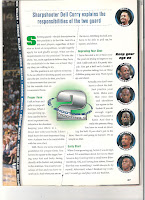I came to appreciate how beneficial that routine was to the children. It gave them a clear, stress-free outline for their day as well as encouragement and self-confidence for their efforts and the incentive to work hard and to try to do their best. Randee’s students, though, like students everywhere, knew all the tricks in the playbook on procrastination when it came to completing their assignments. When the morning meeting was over and it was time to start the lessons, I typically would sit one-on-one with one of the young boys while the teacher’s aides worked with the other children. I’d check the previous night’s homework (usually a worksheet for spelling and another for math) and then apply a sticker and/or a star from a scented marker. No one ever turned down a sticker, although there was the occasional internal debate about which sticker the student wanted and which “flavor” of marker he favored on that day.
“Mr. K, can I get a drink?”
“You just got here.”
“I’m really thirsty.”
“Go ahead.”
But as he made to leave the classroom and head for the hallway, I’d point to the fountain in the sink.
“That water’s no good,” he told me. (This was said by every student in every school about every classroom’s water.)
I relented.
Having apparently quenched his thirst in the hall, he returned.
“O.K.,” I said. “Let’s get started on our spelling.”
“And then we’re done?”
“No.”
“Why (said so plaintively)?”
“Because it’s only 8:50.”
After a page of work, he’d ask to use the bathroom (Randee set a limit of two morning bathroom breaks) and then take a circuitous route to the boys’ bathroom. I watched him from the classroom door as he walked down the hall. He’d turn around and wave to me.
“Mr. K, can I get a tissue?”
So, he went to the sink in the rear of the classroom, where he washed and dried his hands. Rather than deposit the paper towel in the wastebasket, he’d back up and attempt to shoot the wadded-up ball into the basket. It flew a few inches and came up feet short. Retrieving the towel but not getting any closer to his target, he’d shoot again.
“Just dunk it in the garbage,” I finally told him.
To be clear, it was impossible to be mad at him because he never had a bad day and was never not cheerful or respectful. That was the atmosphere Randee created for her students. The other boy in the class, a year younger, was equally innocent and winning. When I would sit with him for his lessons, I’d model the worksheet, starting with my name at the top.
“Now, don’t write ‘Mr. K.’ on your paper. Write your own name.”
He’d smile slyly, waiting for me to notice that he had written “Mr. K” on his worksheet, and then erase it and write his own name. His routine then closely resembled his classmate’s.
Randee never failed to thank me for filling in for her weekly while she underwent chemotherapy or radiation treatments. Believe me, for as hard as I tried, I could only be a pale imitation of Randee. I always told her that her gratitude was misplaced, that it was like thanking me for liking ice cream or playing basketball. It was a privilege to stand in for her. James M. Barrie wrote, “Nothing is really work unless you would rather be doing something else.” I could not imagine Randee doing anything else. Such commitment! Such selfless dedication! Up until her last day in school she was ever solicitous of her three special students and of trying to ensure that their needs would be met during her absence.

